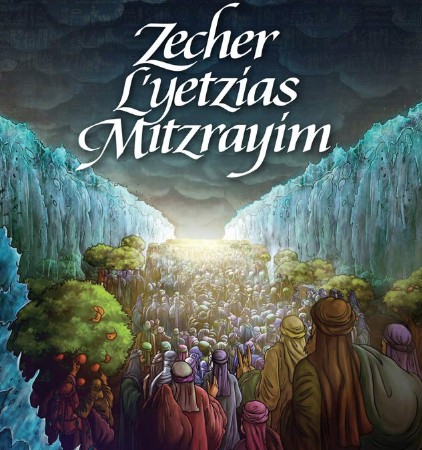
Operation Inspiration
We do so many things that are “a reminder of the Exodus from Egypt.” When we say Shema multiple times a day, we mention that Hashem took us from Egypt to be our G-d. It is required for us to remember it daily, day and night. But what do you think of when you think of “Yetzias Mitzrayim”?
For me, I must admit, I think of splitting the sea and the miracles Klal Yisrael experienced when we saw Hashem take revenge on the Egyptians. If it were music, there would be a rousing crescendo as the protagonists (us) marched proudly forth out of the sea bed while the waves crashed down upon our enemies, drowning them. You can almost hear their muffled screams as gentle background noise merely incidental to the resounding, upbeat chords and notes heralding our redemption.
But there was more. Yetzias Mitzrayim was not a one-time event, but a process.
There’s a question I’ve heard which asks that the syntax is wrong. It should have been, “Yetzia Mi’Mitzrayim,” the going out from Egypt, and not “Yetzias Mitzrayim,” the going out of Egypt, implying that it was Egypt that moved, and that it is the subject of the phrase. The very telling answer is that, indeed, we commemorate not merely the fact that the Jews were taken out of Egypt, but that Egypt was taken out of the Jews.
The culmination of our redemption was the fact that we were no longer subservient to the influences of Mitzrayim; to its impurity and misguided values. When we became free of the grip this society held over us emotionally and intellectually, we tasted true freedom, and that didn’t simply occur when we saw the Egyptians perish in the sea. It started well before that.
When the plagues occurred, it must have been very unsettling. The Jews must have heard the commotion and screams of the Egyptians. For a time, perhaps, they were not scared, as the bad things kept happening to “them,” to “the other guys” and it never hit home. All that changed with Makkas Choshech.
While the Egyptians were stuck in place day after day, unable to move or see or do pretty much anything but think about what they had done and what they were going through, the Jews dealt with something very frightening – a plague of their own.
Chazal tell us that during the days of darkness, eighty percent of the Jewish population perished. Hashem made them die then so the Egyptians would not see all the burials taking place and realize that the Jews were suffering too. It would have been a Chillul Hashem, a desecration of G-d’s name, for the Jews to be seen as sinners in the eyes of their hostile hosts. That still applies, by the way. If we appear sinful to the non-Jews around us, that is degrading to HaKadosh Baruch Hu’s reputation.
So what happened then? The Jews saw that they were no longer completely protected from tragedy. When the next plague came, Makkos Bechoros, the killing of the first born, they must have been unsettled. Maybe they’d used up their merits as their forefather Yaakov had feared. Maybe the time of their protection was over. And what happened? They were quarantined.
Moshe told them, “You are to take the blood of the Korban Pesach and spread it on your doorframes. It shall be a sign that will make the Angel of Death pass over your homes.” They were further told, “No one may leave his home until morning.”
There they were, locked in their homes, hearing the terrible anguished cries outside, uncertain of what would happen. They didn’t know if the screams they heard would enter their homes or whether Hashem would protect them. Perhaps they, like those who perished in the darkness, were unworthy!
So they looked at the blood upon the doors. Unlike Hollywood’s movie version, the blood was not painted on the outside for the angel to see as he flew by. Rather, it was smeared inside, so that we, the people locked inside, could see it. It was a reminder to us that Hashem was in control and would not allow evil to befall us if it wasn’t so decreed.
We need to remind ourselves of this all the time. Hashem wants to be our G-d; which means that He takes care of all our needs and ensures we are protected. If bad things happen, it’s not up to us to explain them and say it’s a punishment for one thing or another, nor to say, “THIS is what Hashem is telling us.” We don’t know specifics, but we do know that the uncertainty is only for us, not for Hashem. He knows what He’s doing.
I think that what we’re going through now in much of the world, with the uncertainty pervading the atmosphere due to Coronavirus, is a reminder to what we went through in Egypt. Giving up control and recognizing that all the honor and power are to Hashem, are part of the process.
When we finally reached the shore upon stepping out of the Yam Suf, we achieved a clarity that shone its light on all the steps of our Exodus, including how the challenges we faced changed us for the better. The redemption of the Moshiach will be myriad times greater and the clarity will illuminate all of history. Get your cymbals ready for the finale; it’s gonna be big.
© 2020 – All Rights Reserved
Did you enjoy this column? Feedback is welcome and appreciated. E-mail info@JewishSpeechWriter.com to share your thoughts. You never know when you may be the lamp that enlightens someone else.